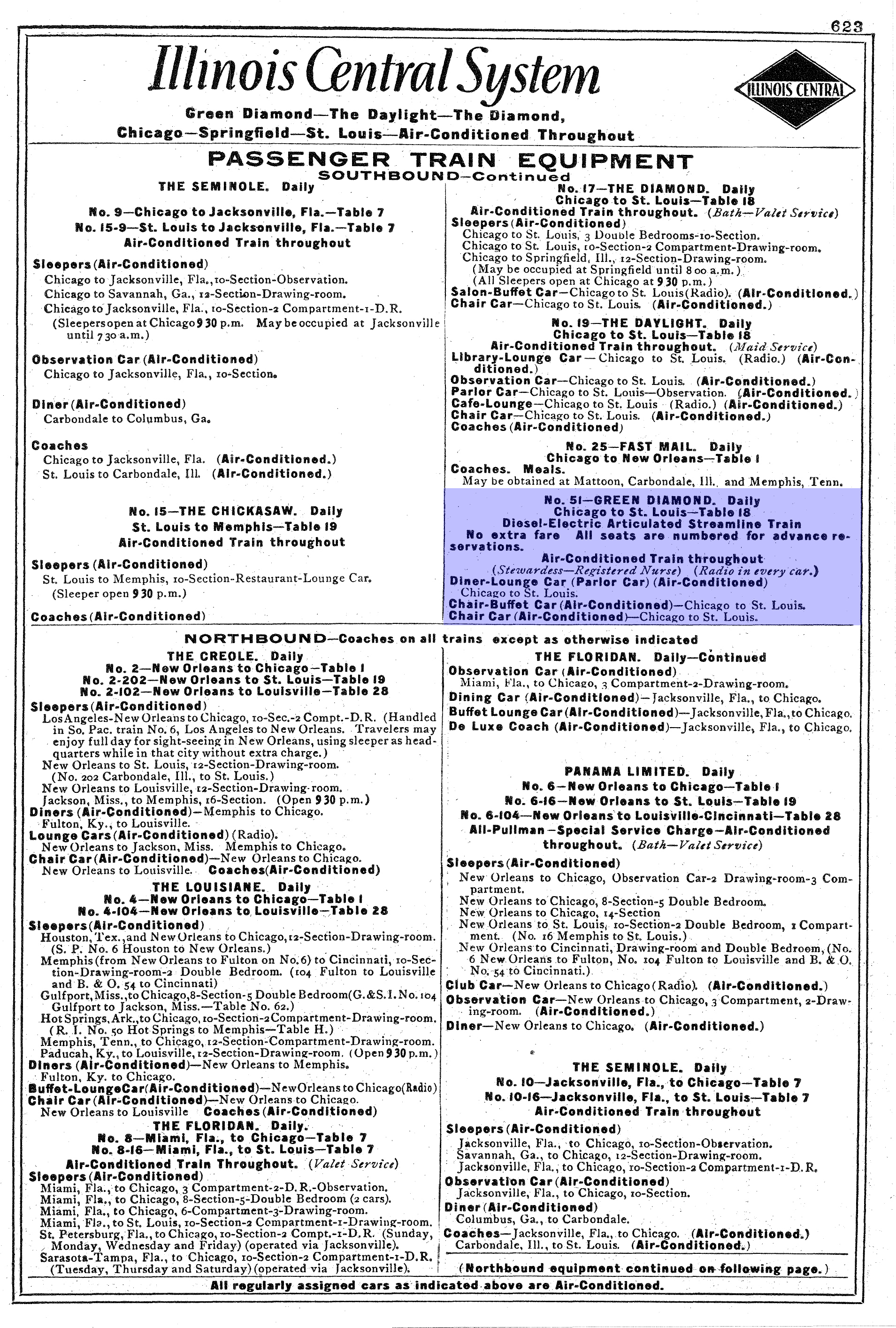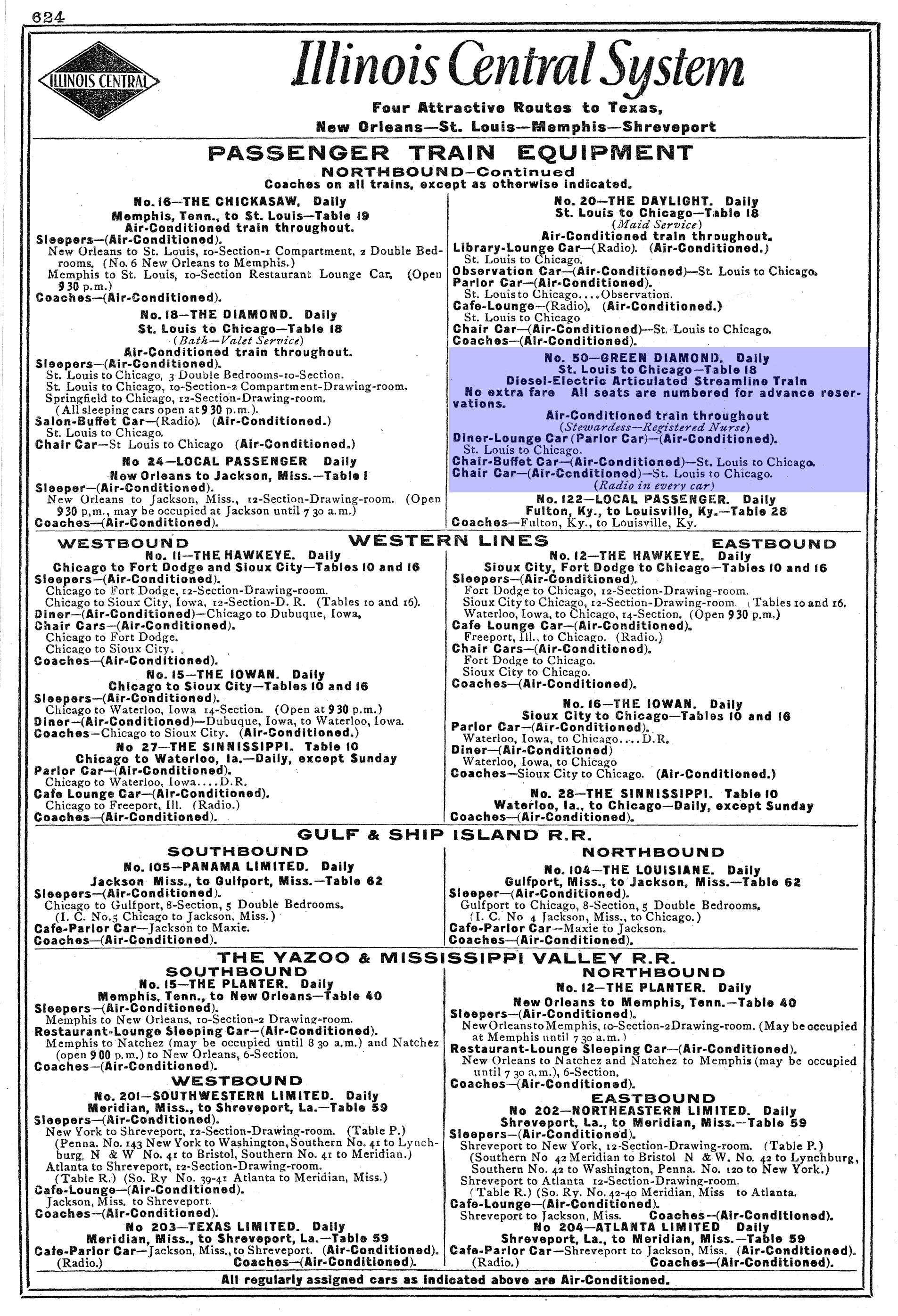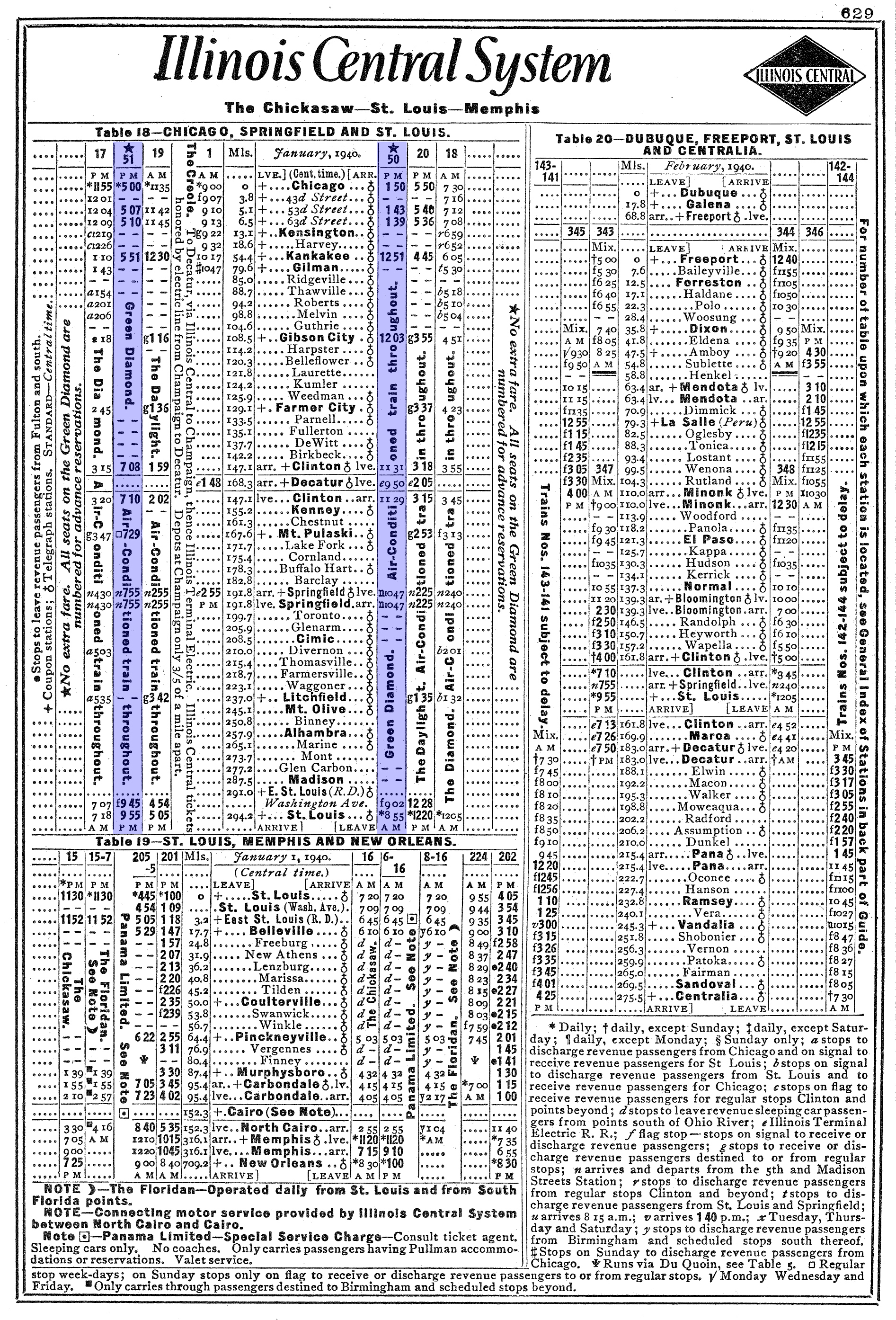"Green Diamond" (Train): Timetables, Route, History
Last revised: February 24, 2025
By: Adam Burns
Another of the early pioneering streamliners, sometimes overlooked, was the Illinois Central's Green Diamond. The train carried many characteristics of Union Pacific's first streamliner, the M-10000.
It was not be mere coincidence; the Diamond was built by the same company as the M-10000 and at the time UP had a controlling interest in the IC.
The Diamond ushered Illinois Central into the streamliner era. The railroad quickly embraced the new concept as it would eventually boast an entire fleet of such trains, such as the Panama Limited and City of Miami.
While the choice of green for the Diamond is understood (a nod to the green used in the railroad's diamond herald), it was somewhat interesting considering the railroad is best known for its chocolate and orange livery.
The Diamond was one of the last of its kind when constructed and remained part of IC's early fleet for many years.
Finally, as the railroad acquired increasingly more new equipment and power through the 1940's, rolling stock which was non-articulated and could be added to any train, it was retired in 1950. Unfortunately, the trainset was not preserved.
Photos
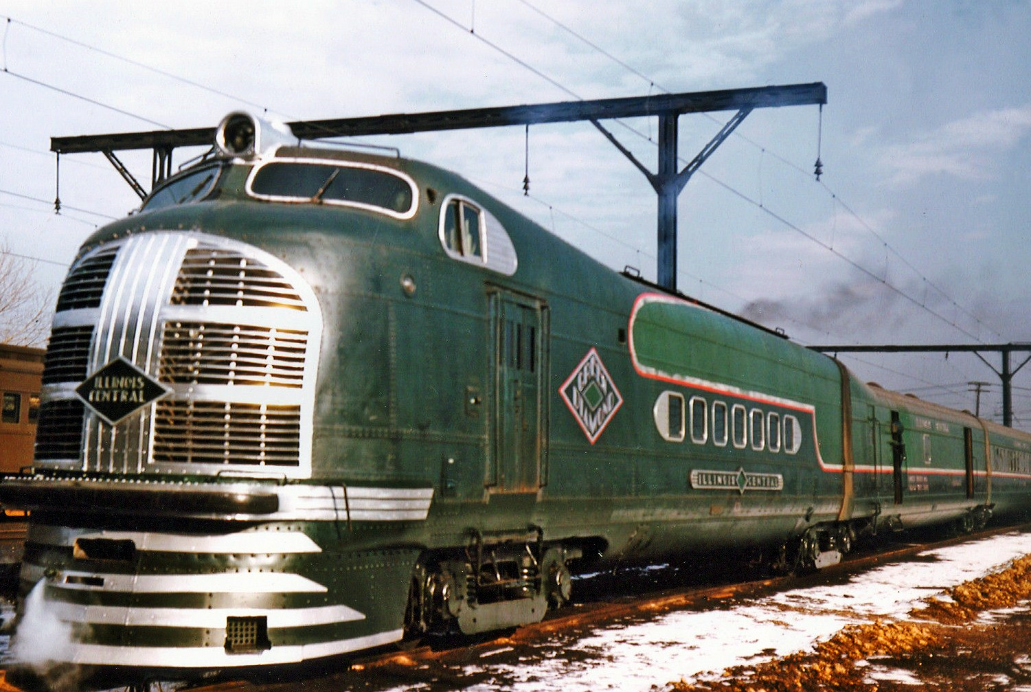 A rare, original color photograph of Illinois Central's first streamliner, the "Green Diamond," probably taken in the early 1940's. While the location is not known given the overhead catenary it may have been taken along the IC's electrified commuter trackage in Chicago.
A rare, original color photograph of Illinois Central's first streamliner, the "Green Diamond," probably taken in the early 1940's. While the location is not known given the overhead catenary it may have been taken along the IC's electrified commuter trackage in Chicago.History
Whether the Illinois Central entered the streamliner era on its own accord after seeing the sleek new entries introduced by UP and Chicago, Burlington & Quincy (the Pioneer Zephyr) or through direct oversight by Union Pacific is unknown.
Whatever the case, soon after those two trains were introduced to the public in early 1934 the IC set after its own streamliner. Just as UP had contacted Pullman-Standard about the construction of its train, IC did the same and as mentioned above the two designs were remarkably similar.
The Green Diamond was a five car, articulated trainset whose power-car featured a large, bulbous grilled nose and crew cab located on top in a turret-like fashion.
Consist (1940)
The consist included a mail-baggage car, reclining seat coach, coach-buffet, and a diner-lounge. The train was fully air-conditioned and while the interior design was subtle included classic Art Deco of the period.
Some of the most noticeable differences from UP's streamliner included the Diamond's Cor-Ten steel construction as opposed to aluminum and a standard diesel engine for power, built by Electro-Motive that offered 1,200 horsepower (the M-10000 featured a Winton Engine gasoline engine).
The train's exterior was clad in a striking two-tone green livery (listed as a Cypress Green below the windows and a Cedar Green above) offset with an aluminum trim that really stood out against the dark paint.
Timetable (1940)
Inauguration
The name Green Diamond had a great significance to the company as it was the Illinois Central's longtime logo. During April and May, 1936 the train went on a publicity tour around its system between the Midwest and Southeast covering 7,000 miles in the process and visiting such towns as Detroit, San Antonio, Oklahoma City, and Milwaukee.
During that time more than 414,000 visitors toured the train. Following the tour the train officially debuted on May 17, 1936 departing Chicago's beautiful Central Station at 5 pm and arrived at St. Louis Union Station at 9:55 pm. Total distance between the two cities was 294 miles and required a total of 4 hours, 55 minutes.
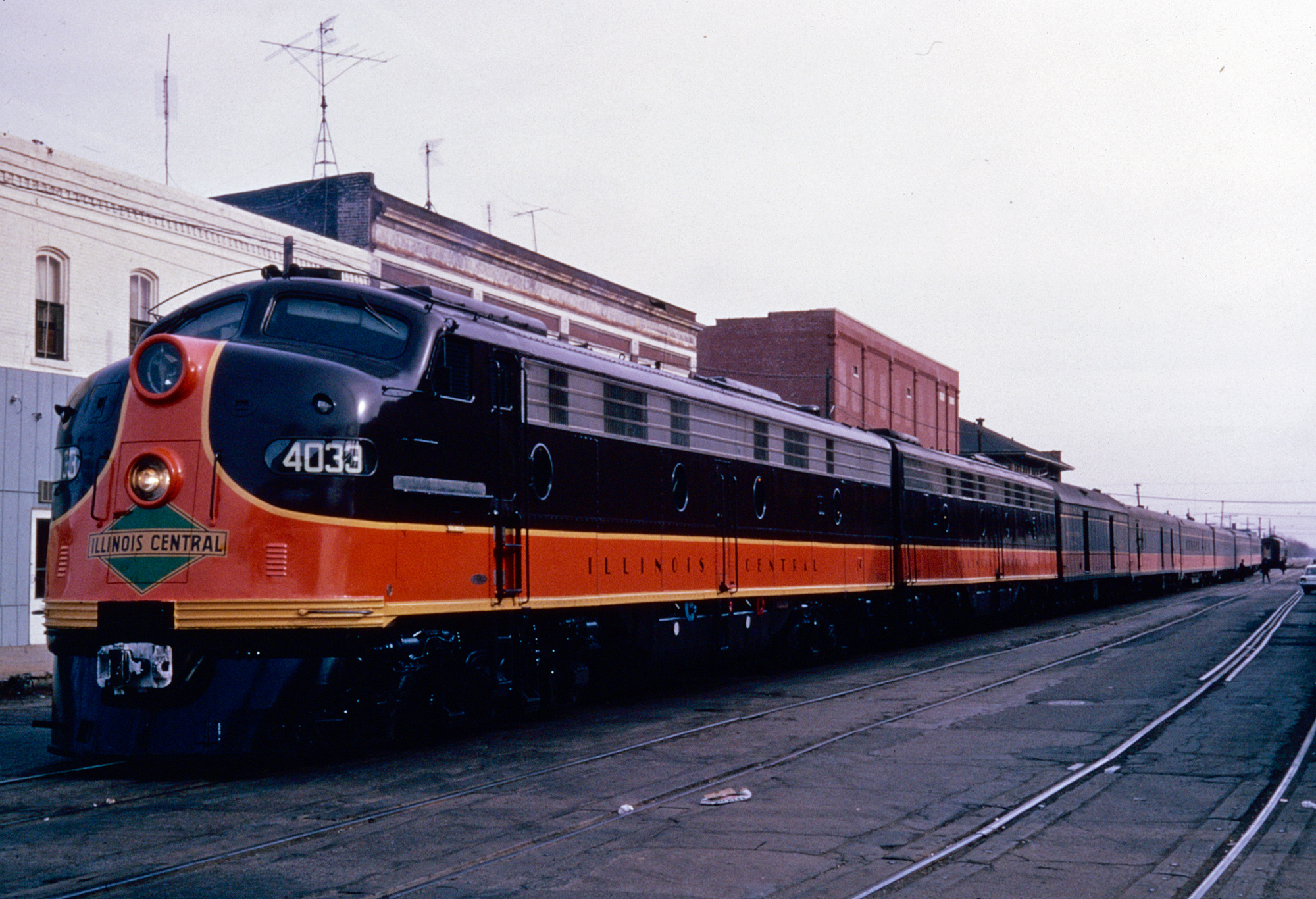 An A-B set of sparkling Illinois Central E8's, led by #4033, have train #21, the southbound "Green Diamond," stopped at Springfield Union Station, circa 1965. American-Rails.com collection.
An A-B set of sparkling Illinois Central E8's, led by #4033, have train #21, the southbound "Green Diamond," stopped at Springfield Union Station, circa 1965. American-Rails.com collection.The Illinois Central was also quick to tout this fast schedule with its most famous advertisement stating, "Enjoy the fastest service ever offered and the supreme luxury of America's smoothest riding train.
Air-conditioned...radio in every car...Stewardess...Delicious inexpensive meals as low as; breakfast 25 cents, lunch 35 cents, and dinner 40 cents." For the next 10 years few changes were made to the train as it continued to see relatively high ridership, particularly during the conflict of World War II.
Timetable (June, 1938)
| Read Down Time/Leave (Train #51) | Milepost | Location | Read Up Time/Arrive (Train #50) |
|---|---|---|---|
| 5:00 PM (Dp) | 0.0 | 1:50 PM (Ar) | |
| 5:07 PM | 5.1 | 1:43 PM | |
| 5:10 PM | 6.5 | 1:39 PM | |
| 5:51 PM | 54.4 | 12:51 PM | |
| 108.5 | 12:03 PM | ||
| 7:08 PM (Ar) | 147.1 | 11:31 AM (Dp) | |
| 7:10 PM (Dp) | 147.1 | 11:29 AM (Ar) | |
| 7:29 PM | 167.6 | ||
| 7:55 PM | 191.8 | 10:47 AM | |
| F 9:45 PM | F 9:02 AM | ||
| 9:55 PM (Ar) | 294.2 | 8:55 AM (Dp) |
In early 1947 the trainset was sent to the IC's Paducah Shops for a major overhaul, part of which was a reconfiguration of the articulation so that the equipment could be interchanged and powered by regular diesel locomotives. In April the work was complete and the train was no longer recognized as the Green Diamond.
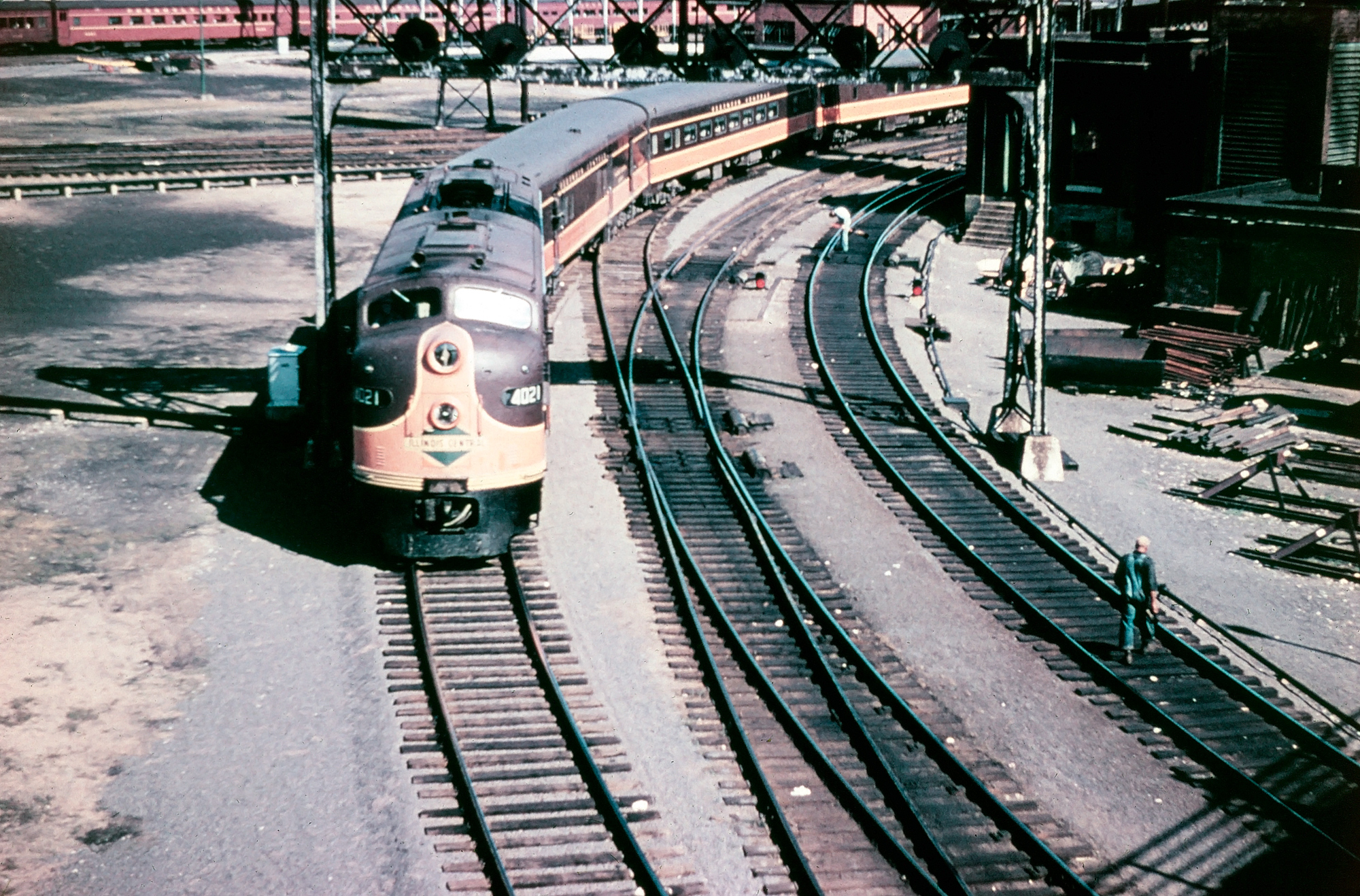 Illinois Central E8A #4021 departs St. Louis Union Station with the northbound "Green Diamond," on August 31, 1955. American-Rails.com collection.
Illinois Central E8A #4021 departs St. Louis Union Station with the northbound "Green Diamond," on August 31, 1955. American-Rails.com collection.Final Years
Additionally, the trainset's old routing was changed as it now served Jackson, Mississippi, and New Orleans, Louisiana as the Miss-Lou. What remained on the original trainset continued on this routing until it was officially retired in early August, 1950.
However, the Diamond's old routing, and the name, continued to serve the Chicago-St. Louis corridor with traditional equipment and Illinois Central's classic orange and chocolate brown passenger livery.
As Mike Schafer and Joe Welsh note in their book, "Streamliners: History Of A Railroad Icon," in 1947 the Chicago-St. Louis Green Diamond was not only upgraded with new Pullman-Standard streamlined cars and rebuilt heavyweight streamlined cars.
The late era-version of the Green Diamond remained in service until May 19, 1968. The next day it was renamed the Governor's Special and truncated to Springfield, Illinois.
By then, intercity passenger service across the country was in rapid decline. Within three years most privately run such operations would be handed over to Amtrak. Today, IC's former City of New Orleans survives as part of the national carrier's network.
Recent Articles
-
Colorado Short Line Railroads: A Complete Guide
Mar 28, 25 04:37 PM
This information highlights the active short line railroads operating within the state of Colorado. -
California Short Line Railroads: A Complete Guide
Mar 28, 25 01:30 PM
This information denotes all active short line railroads operating throughout the state of California. -
Arkansas Short Line Railroads: A Complete Guide
Mar 28, 25 01:15 PM
This page features the active short line railroads operating throughout the state of Arizona, which currently totals well over a dozen.
